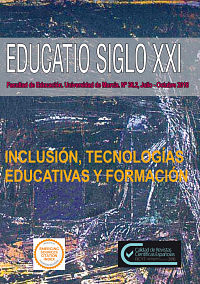Educadores militantes: Educar para la vida mediante el trabajo en empresas de inserción
Resumen
Este artículo se centra en el derecho a la
educación para personas que viven en
contextos de vulnerabilidad, en sintonía
pero diferente a la aproximación de Escu-
dero: en primer lugar, es una mirada sobre
la educación no de jóvenes sino de perso-
nas adultas, muchas de ellas con trayecto-
rias educativas truncadas, y todas ellas tras
haber pasado por situaciones vitales que
bien pueden calificarse de marginación y
exclusión. En segundo lugar, ofrece una
mirada a la práctica educativa en un con-
texto no escolar, sino productivo, ya que
pone el foco de atención sobre el apren-
dizaje, tanto intencional como informal,
que tiene lugar en empresas de inserción.
En tercer lugar, nuestra perspectiva es la
de los educadores, que en este caso no
son docentes, sino personal de acompa-
ñamiento contratado en las empresas de
inserción con la doble función de educar
y promocionar al personal a su cargo a la
vez que contribuir a la producción de la
empresa.
A partir de tres casos cuya información se
ha recogido y analizado cualitativamente,
se exponen y discuten las funciones que
realiza este personal, cómo planifican el
itinerario y gestionan cada una de sus fa-
ses, en qué competencias y saberes ponen
los énfasis y, por último, y de ahí también
el título del artículo, en qué medida en-
tienden su trabajo como un compromiso
vital y cuál podría ser, por lo tanto, su en-
foque de enseñanza, sin perder de vista las
condiciones laborales ni a la precariedad
en el mundo del trabajo.
Descargas
-
Resumen495
-
PDF431
Las obras que se publican en esta revista están sujetas a los siguientes términos:
1. El Servicio de Publicaciones de la Universidad de Murcia (la editorial) conserva los derechos patrimoniales (copyright) de las obras publicadas, y favorece y permite la reutilización de las mismas bajo la licencia de uso indicada en el punto 2.
2. Las obras se publican en la edición electrónica de la revista bajo una licencia Creative Commons Reconocimiento-NoComercial-SinObraDerivada 4.0 Internacional (texto legal). Se pueden copiar, usar, difundir, transmitir y exponer públicamente, siempre que: i) se cite la autoría y la fuente original de su publicación (revista, editorial y URL de la obra); ii) no se usen para fines comerciales; iii) se mencione la existencia y especificaciones de esta licencia de uso.
3. Condiciones de auto-archivo. Se permite y se anima a los autores a difundir electrónicamente las versiones pre-print (versión antes de ser evaluada) y/o post-print (versión evaluada y aceptada para su publicación) de sus obras antes de su publicación, ya que favorece su circulación y difusión más temprana y con ello un posible aumento en su citación y alcance entre la comunidad académica. Color RoMEO: verde.











